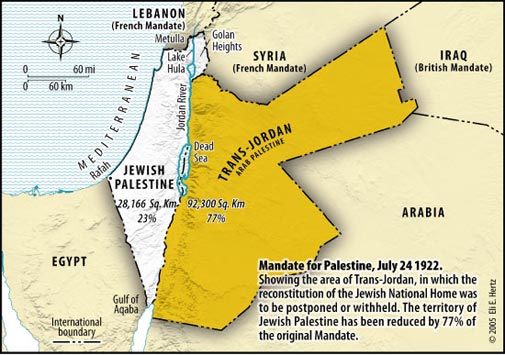It took Jordan's King Abdullah II just a 10 minutes helicopter flight from Jordan to Ramallah on 26 March to meet Palestine Liberation Organisation (PLO) leader Mahmud Abbas in Ramallah - itself only 15 minutes' drive from Jerusalem - Abdullah's first trip to Judea and Samaria (West Bank) since 2017. The Arab Weekly reported on Abdullah's visit:
"Well-informed Jordanian sources have linked the previously unannounced visit of the Jordanian king to Ramallah, the seat of the Palestinian Authority, to the Negev Summit. They said that Jordan was uncomfortable with the new "Abrahamic" peace process between Israel and Arab countries. It particularly resents being marginalised and losing control over its most important card, the Palestinian issue."
Abdullah has only himself to blame for Jordan's growing marginalisation--abandoning the policy pursued by his great-grandfather King Abdullah I and his father King Hussein of unifying the two Arab populations living on both sides of the Jordan River into one State between 1950 and 1967.
Abdullah instead has been supporting the PLO demand for the creation of an independent Arab state west of the Jordan River - in addition to Jordan east of the Jordan River: two Arab states and one Jewish state within the territory comprised in the 1922 League of Nations Mandate for Palestine (Mandate).
Abdullah needs to rethink supporting the PLO's demand if he wishes to regain control of decisions to be made west of the Jordan River affecting Arabs and Jews in the last 5% of former Palestine where sovereignty still remains unallocated between Jordan and Israel after 100 years of conflict.
Abdullah's marginalisation also risks Jordan losing its role as the custodian of the Muslim Holy Shrines in Jerusalem conferred on Jordan in 1994 by the Washington Declaration and Israel-Jordan Peace Treaty.
Between 1950 and 1967:
- Judea and Samaria (West Bank) - which included Ramallah - was part of Jordan - and its residents were Jordanian citizens
- The PLO did not claim regional sovereignty "over the West Bank in the Hashemite Kingdom of Jordan" or the "Gaza Strip" on its founding in 1964 - claiming only that "Palestine with its boundaries at the time of the British Mandate is a regional indivisible unit"
- Abdullah's father King Hussein - at page 118 of his published memoirs Uneasy Lies the Head (1962) - justified continuing Jordanian rule on both sides of the Jordan River against international condemnation:
"Palestine and Jordan were both under British Mandate, but as my grandfather pointed out in his memoirs, they were hardly separate countries. Transjordan being to the east of the River Jordan, it formed in a sense, the interior of Palestine"
Jordan comprises 78% of the territory of former Palestine whilst Judea and Samaria (West Bank) comprises just 4%.
Abdullah's visit to Ramallah took place at the same time as the Negev Summit was putting life into the Abraham Accords - Israel's Foreign Minister working with his counterparts from Bahrain, Egypt, Morocco and the United Arab Emirates on shared challenges and interests--along with US Secretary of State Antony Blinken's encouragement and support.
Ending the 100 years-old conflict between Arabs and Jews has become increasingly urgent with no movement in sight to create an additional Arab State west of the Jordan River after almost 30 years of failed political and diplomatic attempts and pressure from the United Nations.
The reunification of the Arab populations living on both sides of the Jordan River - as existed between 1950 and 1967 - by re-drawing the current international border between Israel and Jordan in direct negotiations - is the kiss of life that can end the Arab-Jewish conflict.
Author's note: The cartoon--commissioned exclusively for this article--is by Yaakov Kirschen aka "Dry Bones"- one of Israel's foremost political and social commentators--whose cartoons have graced the columns of Israeli and international media publications for decades.






